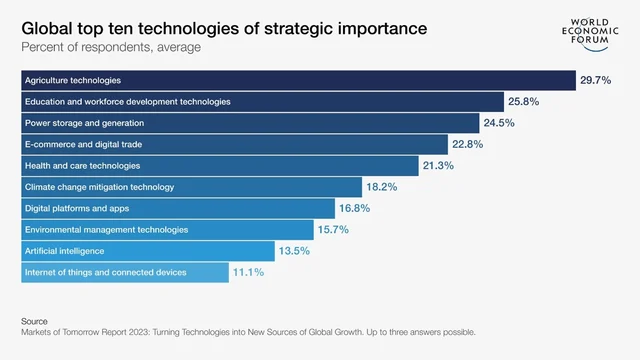WEF releases new report on Markets of Tomorrow just before Davos
A new World Economic Forum (WEF) report, Markets of Tomorrow Report 2023: Turning Technologies into New Sources of Global Growth shows how improved public-private collaboration can drive investment to build new markets while making progress towards societal and environmental goals. The research, based on a survey of 12,000 global executives, finds that agritech, edtech and energy-related technologies are seen by businesses as the most strategically important over the next 10 years in over 120 economies. The report calls on government and business leaders to double down on deploying technologies to create the markets and jobs of tomorrow.
Markets of Tomorrow report examines the technologies and sectors that are set to create new sources of growth. It draws on more than 12,000 responses from over 120 economies to the World Economic Forum’s Executive Opinion Survey.

It finds that agricultural technologies are considered the most strategically important technologies for economies in the next decade. Ranging from low-tech irrigation methods to precision agriculture and farming drones, emerging agricultural technology is unleashing efficiency gains, boosting agricultural output and creating new green jobs.
Education and workforce learning ranks second, where emerging digital tools and platforms, including metaverse learning, artificial intelligence and ubiquitous computing, are driving innovation. The sector is experiencing an accelerated rollout of education technologies after the COVID-19 pandemic caused a historic loss of education globally.
Finally, power storage and generation technology scored third in the global ranking, reflecting the increasing urgency of transitioning to low-carbon energy systems. Battery and other storage technology holds the key to integrating renewable energy generation at scale into energy grids globally and this represents a significant area of current innovation and investment.
These findings are generally consistent across low-and high-income economies, with four of the top five priority technologies shared across all income groups. However, climate change mitigation technology strikes a notable difference, ranking as the most important technology in high-income countries but eighth across all other income groups.
In parallel, new World Economic Forum analysis, in collaboration with Accenture, finds that an additional 76 million jobs in green and social sectors are needed by 2030 across 10 economies alone: Australia, Brazil, China, Germany, India, Japan, South Africa, Spain, the United Kingdom and the United States. Highlighting the wider job-creating potential of proactively building the markets of tomorrow, Jobs of Tomorrow quantifies for the first time the number of green and social jobs needed to help create socially inclusive and environmentally sustainable societies.
Social jobs, defined as occupations within education, healthcare and care, represent 11 percent of the total workforce in the 10 assessed economies. The new report, however, finds that countries will need to increase the number of social jobs by 37 percent by 64 million to make progress on inclusion and social mobility goals.
To meet the goals of a green transition, a labour force with green skills will be essential. But green jobs, currently represent just 1 percent of the surveyed workforces. An additional 12 million green jobs are needed to make progress on environmental objectives, representing a 66 percent increase on current numbers.






